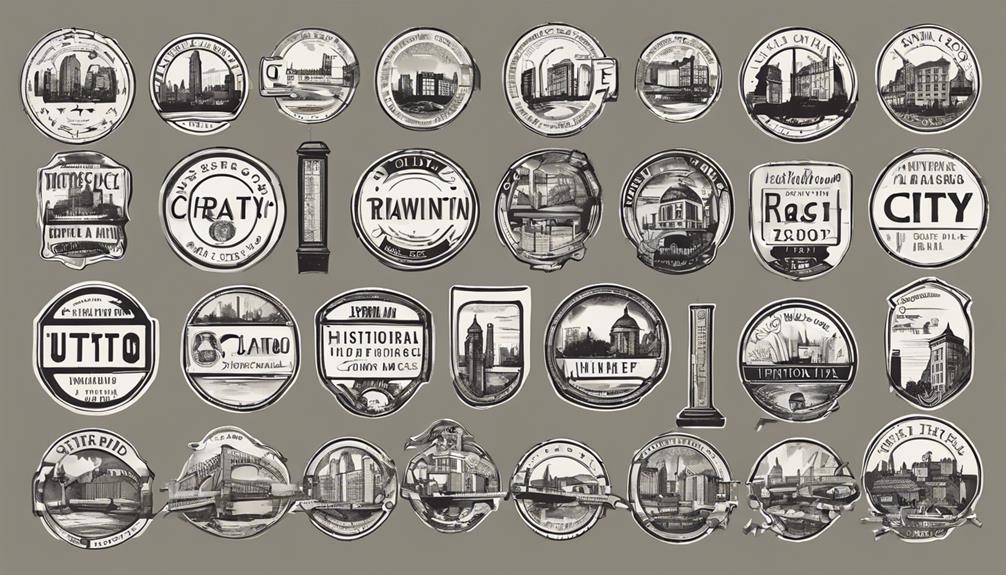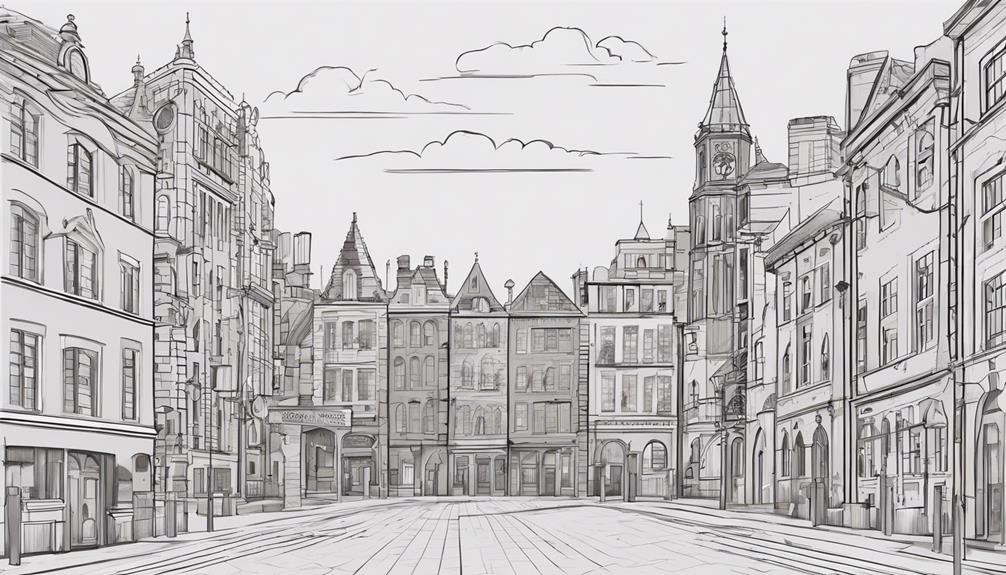The naming of cities and towns is a multifaceted phenomenon that intertwines historical, cultural, and linguistic elements. From ancient city-states to modern metropolises, the reasons behind the diverse nomenclature are as complex as the cities themselves. Factors such as conquests, migrations, trade routes, and folklore have all left their mark on urban nomenclature, shaping the identities of these settlements over time. By exploring the intricate web of influences that have contributed to the naming of cities and towns, one can uncover a tapestry of human history and geography that continues to intrigue scholars and enthusiasts alike.
Key Takeaways
- Geographical features, historical events, and cultural influences shape city names.
- Colonial heritage, societal advancements, and industrial connections impact town naming practices.
- Global perspectives and linguistic diversity play a role in urban naming trends.
- Cultural significance, folklore, and legends inspire the diverse array of city and town names.
Origins of City Names

The etymology of city names, tracing back to their origins, provides valuable insights into the historical, geographical, and cultural underpinnings that have influenced their nomenclature. Geographical features often play a significant role in shaping city names. Cities named after such features typically showcase a connection to the land they inhabit. For instance, a city situated near a prominent mountain might adopt a name reflecting this characteristic. Rivers, forests, and animals indigenous to the region can also serve as inspirations for city names. These geographical descriptors not only provide a sense of place but also contribute to the identity and character of the city. Understanding how these features influenced the naming of cities can offer a window into the natural environment and resources that were important to early inhabitants. Moreover, it highlights the symbiotic relationship between human settlements and the geographical landscapes they are built upon, emphasizing the deep-rooted connection between cities and their surroundings.
Historical Influences on Town Names
The historical influences on town names encompass a spectrum of factors, including the impact of colonial heritage, the influences of Native American traditions, and the connections forged during the industrial era. Understanding how these elements intertwined to shape the nomenclature of towns provides valuable insights into the cultural tapestry of different regions and periods. By analyzing these influences, we can appreciate the layers of history embedded in the names of cities and towns across the United States.
Colonial Heritage Impact
Reflecting the historical legacy of colonization and settlement patterns, town names in former colonies often bear the imprint of their colonial heritage. The influence of colonial powers can be observed in the origins of many town names, which often stem from the languages of the colonizers. These names frequently serve as commemorative markers of historical figures, events, or significant places from the colonial period. The prevalence of town names derived from European languages underscores the impact of colonial heritage on nomenclature. Such naming practices not only reflect cultural exchanges but also highlight the power dynamics that characterized the colonial era. Through the lens of historical geography, the colonial heritage impact on town names provides insights into the enduring legacies of colonization in shaping urban nomenclature.
Native American Influences
Indigenous cultural heritage profoundly shapes the nomenclature of towns across the United States, with Native American influences intricately woven into the fabric of town names. Native American influences on town names in the U.S. stem from the rich cultural heritage and history of indigenous tribes. Town names like Chicago, Massachusetts, and Mississippi have Native American origins, reflecting early interactions between settlers and indigenous peoples. Native American languages have contributed unique sounds, meanings, and linguistic elements to town names across the country. Indigenous place names often hold deep significance related to geography, natural features, or tribal traditions, enriching the cultural tapestry of town nomenclature. The preservation of Native American town names honors the original inhabitants of the land and acknowledges their enduring influence on the naming of towns and cities.
Industrial Era Connections
In the evolution of town naming practices during the Industrial Era, significant influences from prominent industrial figures and economic activities emerged, shaping the nomenclature of burgeoning settlements. Towns were often named after industrialists, inventors, or specific industrial activities to honor their impact on the local economy. The table below illustrates how industrial connections influenced town names by reflecting dominant economic activities:
| Industrial Influence | Town Names |
|---|---|
| Mining | Silverton, Coalville |
| Manufacturing | Milltown, Foundryville |
| Textiles | Cottonwood, Weaverville |
| Transportation | Railton, Port Harbor |
These town names were intricately linked to the economic development of regions, encapsulating the essence of their industrial heritage and economic prosperity.
Cultural Significance in Naming Cities
Naming cities based on cultural significance serves as a vital means of preserving heritage, traditions, and local identity. City names often reflect cultural significance through historical events, influential figures, or symbolic meanings. This practice not only connects present-day communities to their past but also fosters a sense of pride and belonging among residents. The cultural significance of city names can act as a powerful reminder of past achievements, struggles, or values held dear by the community. Additionally, cities with culturally significant names may attract tourists eager to delve into the history and meaning behind the names, thus promoting cultural exchange and enriching the local economy. Overall, the deliberate choice of city names based on cultural significance plays a crucial role in shaping the collective identity of a community, reinforcing its unique heritage, and ensuring that its legacy endures for generations to come.
Evolution of Urban Naming Conventions

How have urban naming conventions adapted and transformed in response to cultural shifts and historical influences? The evolution of urban naming conventions is a dynamic process shaped by various factors such as cultural influences, historical events, and linguistic considerations. Cities and towns derive their names from a multitude of sources, reflecting the changing trends in society and the diverse elements that influence naming practices.
To illustrate the complexity of urban naming conventions, consider the following table showcasing different sources and influences on the names of places:
| Category | Description |
|---|---|
| Historical Figures | Cities named after important leaders or historical figures. |
| Geographic Features | Towns named after prominent natural landmarks or geographical features. |
| Cultural Heritage | Urban areas named to preserve cultural heritage or traditions. |
| Industrial Influence | Cities named after industries that played a significant role in their development. |
This table exemplifies the diverse origins of urban names and emphasizes how the evolution of naming conventions mirrors the cultural and historical tapestry of human settlements.
Impact of Geography on City Names
Geographic features play a fundamental role in shaping the names of cities and towns worldwide. Whether it be rivers, mountains, or valleys, these natural landmarks often find their way into the nomenclature of urban areas. Understanding how geography influences city names can provide insights into the historical events and environmental factors that have contributed to the development of these urban centers.
Geographic Features Influence Names
Influenced by the surrounding landscape, city names often mirror the prominent geographic features of their locations.
- Rivers cutting through city centers inspire names like Riverdale or Rivertown.
- Cities nestled at the base of mountains adopt names such as Summitville or Valleyview.
- Towns surrounded by dense forests may be called Woodland or Greenwood.
- Coastal cities often bear names like Bayview or Seaside, reflecting their proximity to water bodies.
These natural features serve as more than just labels; they provide a sense of direction, help in navigation, and establish a strong link between the city and its environment. Geographic characteristics play a vital role in shaping the identity of a place through its name.
Historical Events Shape Naming
The evolution of city and town names is intricately intertwined with the historical events that have shaped human societies and their geographical surroundings. Historical events such as colonization, wars, and migrations have significantly influenced the naming of cities and towns. Conquests and settlements by different civilizations, trade routes, and strategic locations have all played a role in the naming process throughout history. Moreover, the cultural and linguistic influences of various groups have contributed to the diverse names of cities and towns around the world. Below is a table showcasing how historical events have impacted the naming of cities and towns:
| Events | Influence on Naming |
|---|---|
| Colonization | Imposition of new names |
| Wars | Renaming due to conquests |
| Migrations | Introduction of new naming conventions |
Famous City Name Etymologies

The etymologies of famous city names often provide intriguing insights into their historical origins and cultural significance. Here are some examples:
- Paris: Named after the Gaulish tribe Parisii who inhabited the region, the city of Paris in France has a deep connection to its geographical roots.
- Rome: The capital of Italy, Rome, derives its name from Romulus, one of the legendary founders of the city, showcasing a blend of myth and history in its etymology.
- London: Originating from the Roman name 'Londinium' during the Roman occupation of Britain, the name London reflects the city's rich historical past.
- Athens: Named after the ancient Greek goddess Athena, the patron deity of the city, Athens in Greece pays homage to its cultural and mythological heritage through its name.
These famous cities not only serve as bustling urban centers but also carry within their names a wealth of historical narratives embedded in their geographical names.
Colonial Legacy in Town Naming
The colonial legacy in town naming reveals historical influences and the cultural significance behind the choice of names. Towns established during colonial eras often bear names that reflect the linguistic imprint left by the colonizers, showcasing a connection to the past. Understanding the colonial legacy in town naming can provide insights into the historical ties and influences that have shaped these communities.
Historical Influences on Names
Reflecting upon the historical influences that shaped town names, it becomes evident that the colonial legacy played a significant role in the naming process of many former colonies. This legacy is characterized by:
- Imposition of new names by colonial powers to assert control and establish authority.
- Retention of colonial names by many towns to preserve historical ties and cultural heritage.
- Name changes post-independence to reflect national identity and reclaim indigenous languages.
- Renaming of towns to honor local heroes and signify a shift towards cultural independence.
These actions highlight the intricate relationship between colonial history and town naming practices, showcasing the evolution of nomenclature influenced by historical contexts and power dynamics.
Cultural Significance in Naming
In exploring the connection between historical colonial influences on town names and their cultural significance, it becomes apparent that the naming process often embodies layers of societal values and power dynamics. When considering German cities, for example, the colonial legacy can be seen in the names of towns that were established during periods of German colonization. These names not only reflect the presence of German settlers but also signify the influence of German language and naming conventions on the local culture. The imposition of these naming practices by colonial rulers serves as a reminder of the colonial past and highlights the intricate interplay between colonial powers, indigenous cultures, and historical contexts. Understanding the cultural significance of town naming reveals the complexities of historical interactions and power dynamics that have shaped these designations.
Industrial Era City Naming Trends

During the Industrial Era, the nomenclature of urban centers underwent a notable transformation as they increasingly bore the names of prominent industrialists, inventors, or key figures synonymous with the burgeoning industrial landscape. This shift in city naming reflected the growing influence and importance of industrial activities in shaping urban environments. Industrial Era city names often carried significant meaning related to the economic activities and historical context of the time.
- Cities were named after industrialists and inventors, honoring their contributions to industrial development.
- Some urban centers were named after key industries such as mining, manufacturing, or transportation, highlighting the primary economic activities of the region.
- Company towns emerged, named after the businesses that established them, showcasing the close relationship between industry and urban development.
- Geographic features, landmarks, and historical events related to industrial progress also inspired city names, connecting the urban centers to their industrial heritage.
Symbolism and Meaning in City Names
The evolution of city naming practices during the Industrial Era demonstrated a noticeable shift towards honoring industrialists and highlighting key economic activities, setting the stage for a deeper exploration of the symbolism and meaning embedded in modern city names. City names often carry symbolism and meaning, reflecting historical events, local culture, or geographical features. This symbolism can honor important figures, commemorate significant events, or represent unique characteristics of the area. Some city names convey historical narratives, cultural heritage, or religious significance through their meanings, providing insights into the city's origins and development. Understanding the symbolism and meaning behind city names adds depth to the identity and heritage of a place, creating a connection to the past for residents and visitors alike. By delving into the significance of city names, one can uncover layers of history and cultural significance that enrich the understanding of a city's unique character and its place in the broader tapestry of human civilization.
Urban Development and Name Changes

Urban areas undergo dynamic transformations that can prompt alterations in their names as a reflection of evolving demographics, cultural influences, and societal developments. Name changes in cities and towns are not uncommon and can be driven by various factors such as:
- Demographics: Shifts in population demographics may lead to a desire for a name change that better represents the current residents of the area.
- Cultural Influences: Changes in cultural dynamics within a city or town may inspire a name change to reflect the new cultural identity or heritage of the community.
- Historical Commemoration: Renaming can be a way to honor historical events, figures, or milestones significant to the area's cultural and historical heritage.
- Societal Developments: Name changes can also be influenced by societal advancements, political ideologies, or aspirations for modernization and progress, shaping the urban landscape to align with the evolving culture and history of the region.
Folklore and Legends Behind Town Names
In examining the origins of town names, an intriguing aspect to consider is the rich tapestry of folklore and legends that often underlie the nomenclature, providing a deeper understanding of the cultural fabric and historical roots of these communities. Town names steeped in folklore can evoke mythical creatures, legendary heroes, historical events, or local traditions, offering a glimpse into the cultural heritage and storytelling traditions of a community. These tales not only add depth and mystery to the meanings of town names but also shape the unique identity and character of a town. By exploring the folklore behind town names, one can uncover fascinating narratives that enrich the local history and provide insights into the connections between the past and present. Folklore-inspired town names serve as a testament to the enduring influence of storytelling and tradition in shaping the sense of place and belonging within a community, reinforcing the significance of these legends in preserving the heritage of these towns.
Linguistic Diversity in Urban Naming

Diverse linguistic influences shape the nomenclature of cities and towns, reflecting historical, cultural, and socio-political complexities. This linguistic diversity in urban naming is a result of various factors such as historical events, trade influences, and pronunciation challenges. Cities and towns often have different names due to the interplay of languages, cultural relations, and historical contingencies, leading to a rich tapestry of place names. The use of exonyms, different language prestige, and power dynamics further contribute to the varied names of urban areas, showcasing the complexities of naming practices. Additionally, linguistic distance, domination-subordination dynamics, and language prestige play significant roles in the naming of cities and towns, adding layers of meaning and depth to the place names we encounter. Overall, the naming of urban areas is a complex interplay of historical events, modern technology, and cultural heritage considerations that result in the diverse and fascinating array of place names we observe today.
Global Perspectives on City Naming
Exploring the cross-cultural influences on city naming practices provides valuable insights into the global interconnectedness of linguistic traditions. The varied approaches to naming towns and cities worldwide reflect historical, cultural, and linguistic influences. The U.S. stands out for its widespread use of Greek and Roman town and city names. This practice, which peaked between 1790 and 1870, showcases a unique adoption of classical nomenclature for new settlements. Settler nations like Canada, Australia, and South Africa also embrace classical names, albeit to a lesser degree than the U.S. In contrast, countries such as New Zealand and many Latin American nations have incorporated classical names more sparingly. The differing levels of classical town and city name adoption globally highlight the diverse ways in which societies draw from linguistic traditions. Understanding these global perspectives sheds light on the historical and cultural factors that shape town and city nomenclature across the world.
Frequently Asked Questions
Why Do We Call Cities Different Names?
Naming conventions for cities vary due to historical, linguistic, and cultural factors. This diversity in nomenclature can reflect power dynamics, linguistic nuances, and historical legacies. Different names may arise from pronunciation challenges, language preferences, or the influence of past events. The interplay of these elements shapes how cities are identified across languages and regions. Understanding the complexities of naming practices provides insights into the rich tapestry of human societies.
Why Does New York Have a City With the Same Name?
The naming of cities can lead to City Confusion when multiple locations share the same name. In the case of New York, the city's name has historical roots in its colonial past. Originally named New Amsterdam by the Dutch, the city was later renamed New York by the English in honor of the Duke of York. This transition of names reflects the city's history of changing ownership and colonial influences.
How Are Towns and Cities Named?
Naming traditions for towns and cities are diverse and often reflect geographical, historical, or cultural aspects. Common practices include using suffixes like -ton, -ville, -wood, -town, and -son to indicate settlements. Descriptive names can involve features like colors, weather qualities, or landscape elements. Developing realistic town names may involve modifying existing words, combining them with suffixes, or utilizing language generators. Overall, town and city names are a blend of tradition, creativity, and practicality.
Why Do American Cities End in Ville?
American cities ending in '-ville' often signify their origins. The suffix 'ville' originates from French influence, reflecting historical ties to French settlers or cultural impact. This naming convention adds sophistication, hinting at a city's origin while highlighting linguistic and cultural connections. The prevalence of '-ville' in American city names showcases the enduring influence of French colonization on the country's urban nomenclature.
Conclusion
In conclusion, the diverse names of cities and towns around the world are a result of historical, cultural, and linguistic influences. From the origins of city names to the impact of geography on urban naming conventions, the evolution of city names reflects a complex interplay of factors. As the saying goes, "a rose by any other name would smell as sweet," highlighting the enduring significance of the names we give to our urban spaces.
